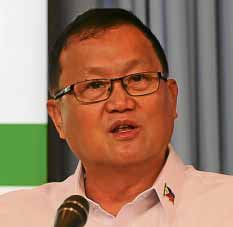ILIGAN CITY — The remaining areas within the 24-hectare main battle zone in Marawi City could be cleared of unexploded ordnances (UXOs) and improvised explosive devices (IEDs) by April this year, paving the way for the start of rehabilitation works, according to Housing and Urban Development Coordinating Council Chair Eduardo del Rosario.
The rehabilitation, Del Rosario said, could not take place unless the clearing operations were completed.
“There is a need to complete the retrieval and detonation of UXOs and IEDs for the safety of workers and the people who would be involved in the rehabilitation of Marawi City,” he said .
Del Rosario also announced that the government had found a 15-hectare area to temporarily accommodate residents pending their permanent
return to their homes.
‘Adopt a Family’ program
“We are looking for funds to acquire this land to build more shelters for the internally displaced persons (IDPs),” he said, adding that Task Force Bangon Marawi (TFBM) aimed to clear the 67 evacuation centers across the two Lanao provinces within this year.
He said that TFBM, which he chaired, also introduced the “Adopt a Family” program and “Send Home a Family” program.
Accommodate IDPs
Under the “Adopt a Family” concept, those who live on the 72 villages outside ground zero would be requested to accommodate IDPs who cannot return yet to the 24 villages
considered as ground zero.
Under the “Send a Family Home” program, TFBM would convince those without properties in Marawi City to return to their original towns and areas.
The government would be providing financial assistance of up to P300,000 to each IDP family under both schemes.
Zia Adiong, a member of the Regional Legislative Assembly (RLA) of the Autonomous Region in Muslim Mindanao (ARMM), said the regional legislative body would tackle the Bangon Marawi Comprehensive Rehabilitation and Recovery Program for the reconstruction of Marawi this March.
Legal framework
Adiong said the RLA wanted to ensure “the effective implementation of identified programs and projects relative to the immediate needs of the damaged city, taking into account the existing legal framework (the Organic Act for the ARMM) and Executive Order No. 125 (the devolution to the ARMM of power over national government projects and programs).”
But Samira Gutoc-Tomawis, a civil society leader in Lanao del Sur, said the rebuilding of the besieged city would be faster if the government would just allow residents to do it on their own. —RICHEL UMEL AND ALLAN NAWAL
